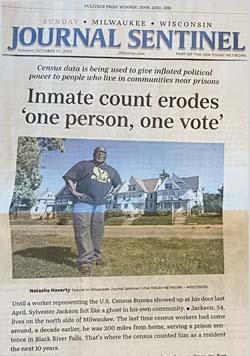One important action can help end local prison gerrymandering in Wisconsin
A confusing and outdated attorney general opinion has forced Wisconsin local governments into prison gerrymandering, but there is still time to fix this before districts are drawn for the next decade.
by Mike Wessler, October 26, 2021
Small, rural cities and counties are particularly susceptible to the impacts of prison gerrymandering. Low populations and a prison building boom have combined to distort local governance and representation in unanticipated ways.
Few places exemplify this problem as vividly as Wisconsin. Take Adams County, which is north of Madison, for example. After it redrew its lines in response to the 2010 census, this community had a district where incarcerated people made up 62.5% of its population. That means 38 residents here have the same political representation as 100 residents in any other district without a prison. It’s even worse in Waupun, where people incarcerated there make up 75.5% of a district, meaning every 25 residents in this district have the same political clout as 100 residents in other parts of the city.
However, no part of the state feels the distorting local impacts of prison gerrymandering quite like Juneau County. After the 2010 census, as the county looked to redraw its political lines, each district needed to have a population of roughly 1,200 residents to ensure equal representation. However, a new massive prison built recently in the county complicated their efforts to draw fair districts. The prison was so big that if leaders included it in a district, it would mean that twenty residents in that district would have as much political representation as 100 residents in districts without a prison.
John Wenum, a longtime county supervisor who oversaw the county’s redistricting efforts in 2011, recently explained to the Milwaukee Journal Sentinel, “(The incarcerated people) weren’t residents in the normal sense… it actually skewed things in some very significant ways.”
Leaders in Juneau County recognized this was a problem and wanted to fix it, so they sought guidance from the state on how to do that, but were told their hands were tied. They learned an outdated and confusing 1981 opinion from the state’s attorney general directs local governments to draw new district lines without excluding incarcerated people. It requires local governments to take part in prison gerrymandering, even though they didn’t want to. In the absence of other legislative or regulatory guidance, attorney general opinions hold significant legal weight, so Wenum and other leaders felt they had no choice. He told the Journal Sentinel, “The attitude here was ‘We’re not going to rock the boat, we’ll go with the flow.'”
The bad news is this opinion meant that for the last decade, some residents of the county have had considerably more say in the actions of their county government than their neighbors.
But the good news is state and local leaders in Wisconsin still have the opportunity to fix this problem for the next decade.
Attorney general opinions are powerful, but like local district lines, they are not set in stone. Wisconsin’s current attorney general, Josh Kaul, can issue a new legal opinion that updates the outmoded legal reasoning from 1981 and makes it clear that local governments can address prison gerrymandering, and there are plenty of reasons for him to do so.
In recent years, more than a dozen states have taken meaningful actions to end this practice, more than 200 local governments have done so, too. Federal courts have ruled against prison gerrymandering. Even the Census Bureau has recognized the validity of efforts to fix this problem and taken steps to make it easier for governments to exclude or reallocate prison populations when drawing new district lines.
As we speak, cities and counties across the country are beginning the process of redrawing their political districts for the next decade. If Attorney General Kaul takes action soon to issue a new opinion, he can help Wisconsin local governments avoid being stuck with another decade of districts distorted by prison gerrymandering.





Mike Wessler’s article on Josh Kaul’s power to help stop some Wisconsin prison gerrymandering is important. This information is not known to most Wisconsonites, even those working for fair representation. The examples of districts where only a minority of citizens hold the power to vote are compelling.
This information should be disseminated here. I would like to send the article to the Milwaukee Journal Sentinel. Better, it could be submitted in some form as an op ed. I can at least write a letter to the editor on the subject. I would also like to send a copy to Josh Kaul in case he hasn’t already seen it.
I’m asking your permission to use the article in these ways. If Mr. Wessler could send the article or some version of it to the Journal Sentinel as an op-ed that would be wonderful. It probably would need to be edited to fit their specifications. I would be happy to do this for him and as the author he could review and make changes before submission.
Thank you.
Virginia Gennis
Virginia,
Thanks so much for your comment. Please absolutely feel free to disseminate this piece in all of these ways in Wisconsin. I’ll also send you an email shortly to highlight other ways to disseminate the information.